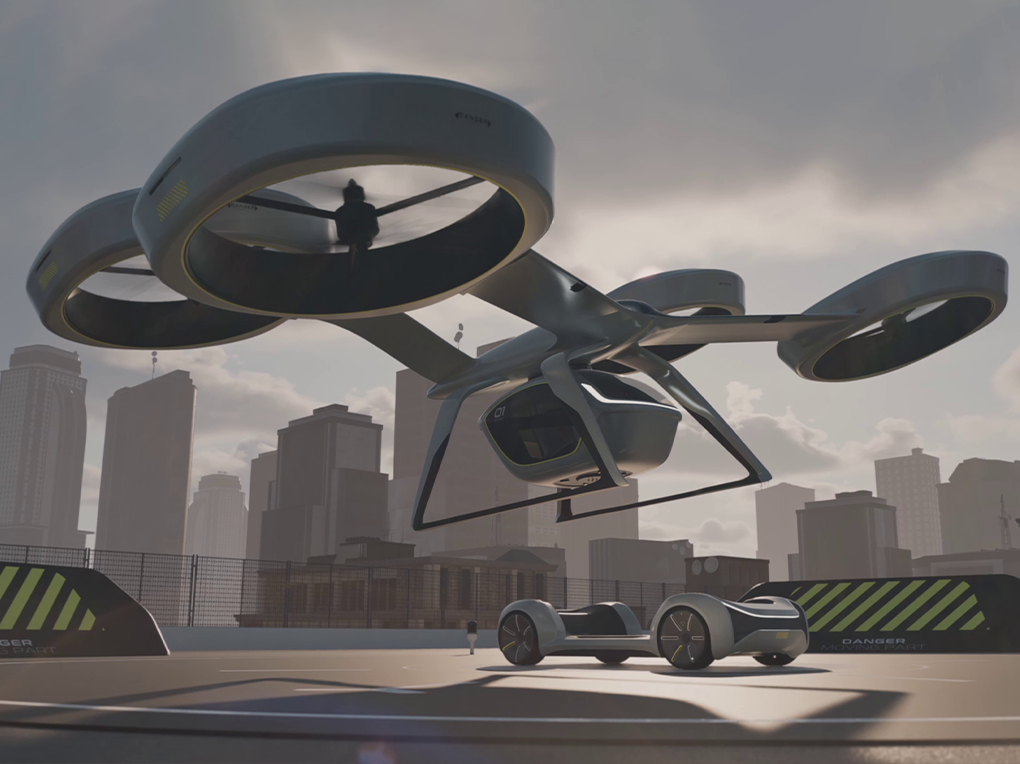The advent of “flying cars” promises to be a transformative leap in the evolution of transportation, opening up boundless horizons of mobility and ushering in a new era of exhilarating possibilities. In the FLY.PT project, a prototype of a personal air transport system was developed at a reduced scale. It consists of an autonomous aerial vehicle (drone) for air travel, an autonomous ground vehicle for land transportation, and a cabin that can be attached to either of these vehicles, creating an integrated transport system.
During the project, various components related to propulsion, energy storage, autonomy, coupling, integration, industrial design, and usage concepts were developed and rigorously tested. A full-scale mockup of the cabin (1:1) was created to demonstrate our capabilities in this aeronautical subsector. The FLY.PT project is part of a Portuguese strategy aimed at addressing the challenges posed by sustainable development in the aeronautical sector.
FLY.PT has equipped us with the technological and knowledge foundation necessary to tackle the ongoing revolution in air transportation. This encompasses concepts of usage, multimodality, and technologies linked to aircraft electrification, autonomous systems, future structural designs, new materials, manufacturing processes, and evolving usage concepts – all of which are key technological challenges in the anticipated disruption of this sector.
The consortium, led by TEKEVER UAS, features the participation of a broad network of companies and entities from the sector, operating within an open innovation framework. This network includes the Aerospace and Defence Cluster Portugal (AED Cluster Portugal / AEDCP). FLY.PT brings together many of the nation’s foremost experts in these fields, including CEIIA, AlmaDesign, INEGI, PIEP, OPTIMAL Structural Solutions, SETSA, ISQ, PIEP, CODI, CONTROLAR, INESC-TEC, University of Évora, IPL, ISEP (CISTER), FHP, Empordef, and the AEDCP association itself.
Indeed, the entities involved in FLY.PT have previously showcased their competencies, both collectively and individually, across various domains. These include Aeronautical Engineering, Mechanical Engineering, Electrical and Computer Engineering, Materials Science, Physics, Chemistry, Industrial Design, and training. Together, they possess an extensive range of industrial resources and technological processes, and in some cases, enjoy international recognition.
The project has facilitated the design of products that enhance future services in an integrated manner, with a comprehensive global vision underpinning a demonstrator for an urban multimodal electric transportation system. The primary aim is to prepare the consortium, both collectively and as individual potential suppliers, for the integration of the national economy into this emerging and disruptive aeronautical subsector. Furthermore, the project rests on extensive collaboration between the national scientific and technological system and the industrial sector, aimed at identifying themes and fostering alignment between these two areas to drive future actions in this field.
The project boasts an overall budget of nearly €10 million in eligible investment, distributed across 6 Products, Processes, Services (PPPs): 1) development of autonomous aerial systems, 2) development of integrated autonomous ground systems alongside aerial systems, 3) development of future cabins, 4) integration of modules, and development and testing of critical systems, 5) operational concepts and platform condition assessment, and 6) project management and dissemination. Each PPP places significant emphasis on integrated demonstrators on a reduced scale, featuring elements with high levels of innovation and technological complexity. These encompass advanced propulsion, artificial intelligence and avionics, batteries, innovative structural designs, structural condition management, design concepts, and novel usage concepts.
We are delighted to extend an invitation to you for a public session, where we will showcase the results of the project through a demonstration of the full-scale prototypes developed as part of the FLY.PT project. This demonstration will take place at the Ponte de Sor airfield, on the TEKEVER premises, commencing at 3.15 pm on September 29th.


